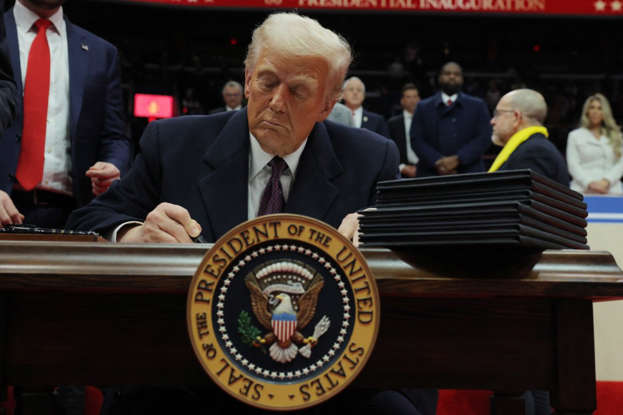EV Mandate Opposition Intensifies: Car Dealerships Push Back

Table of Contents
Financial Burden and Infrastructure Concerns
The transition to an EV-centric market presents significant financial challenges for car dealerships. These challenges stem from substantial upfront investment needs and the limitations of the current charging infrastructure.
High Initial Investment Costs
Dealerships face substantial upfront costs to adapt to the EV sales model. This includes significant capital expenditures in several key areas:
- Upgrading facilities for EV charging infrastructure: Installing fast chargers, upgrading electrical grids, and ensuring sufficient power capacity represent a considerable expense. The cost varies greatly depending on the size of the dealership and the number of chargers needed.
- Training staff on EV technology and maintenance: EV mechanics require specialized training to diagnose and repair EV components, which necessitates investment in training programs and potentially higher salaries for skilled technicians.
- Investing in specialized EV repair equipment: Diagnostic tools, specialized repair equipment, and high-voltage safety equipment are crucial for servicing EVs, adding to the overall financial burden.
- Managing the complexities of EV battery storage and disposal: Dealerships must also grapple with the safe storage and environmentally responsible disposal of used EV batteries, incurring additional costs and logistical challenges. The handling of these hazardous materials requires specific expertise and compliance with stringent regulations.
Lack of Adequate Charging Infrastructure
The current charging infrastructure is insufficient to support widespread EV adoption, creating a significant hurdle for both dealerships and consumers. Dealerships are particularly concerned about:
- The limited range of EVs, leading to “range anxiety” among consumers: This uncertainty deters potential buyers and creates a less appealing market for EVs.
- The uneven distribution of public charging stations, especially in rural areas: The lack of widespread charging access makes EV ownership less practical for many consumers, particularly in less populated regions.
- The reliability and speed of existing charging networks: Inconsistent charging speeds and frequent outages undermine consumer confidence and discourage EV adoption. A reliable, high-speed charging network is crucial for fostering widespread EV acceptance.
Consumer Demand and Market Readiness
Despite government incentives, the current consumer demand for electric vehicles is not keeping pace with the ambitious timelines set by many EV mandates. This mismatch creates significant concerns for dealerships.
Limited Consumer Demand for EVs
Several factors contribute to the relatively low consumer demand for EVs:
- The high initial purchase price of EVs compared to gasoline-powered vehicles: This remains a barrier for many potential buyers, despite government subsidies.
- Concerns about the long-term cost of ownership, including battery replacement: The uncertainty surrounding battery lifespan and replacement costs deters some consumers.
- Limited availability of EV models to suit diverse consumer needs: The range of available EV models, particularly for larger families or those needing to tow, is still relatively limited.
Challenges in Consumer Education and Adoption
Many consumers remain hesitant to adopt EVs due to a lack of information and persistent misconceptions:
- Concerns about charging times and range limitations: Misunderstandings about charging speeds and range significantly influence consumer perception and purchasing decisions.
- Uncertainty about the long-term cost of ownership and battery replacement: Educating consumers about the total cost of ownership, including factors like battery lifespan and energy costs, is critical.
- A lack of understanding of available government incentives and support programs: Many consumers are unaware of the various financial incentives and rebates available for EV purchases.
Impact on Dealership Business Models and Workforce
The shift to EVs requires dealerships to fundamentally adapt their business models and workforce strategies, leading to several potential challenges.
Changes in Sales and Service Processes
The transition to EVs necessitates significant changes in dealership operations:
- New sales strategies focused on explaining EV technology and benefits: Dealerships need to invest in training their sales staff to effectively communicate the advantages of EVs and address consumer concerns.
- Specialized training for service technicians to handle EV repairs: This requires investment in training programs and potentially hiring specialized EV technicians.
- Adaptation to potentially lower service revenue due to the simpler mechanics of EVs: EVs have fewer moving parts than gasoline-powered vehicles, potentially leading to reduced service revenue for dealerships.
Potential Job Losses and Workforce Retraining
The shift away from internal combustion engines (ICE) could lead to job displacement for mechanics specializing in ICE technology:
- The need for extensive retraining programs for their existing workforce: Dealerships need to invest in retraining programs to equip their mechanics with the skills needed to service EVs.
- The potential for increased labor costs associated with specialized EV training: The cost of training and recruiting specialized EV technicians will increase labor costs for dealerships.
- The difficulty in attracting and retaining skilled EV technicians: The demand for skilled EV technicians is growing, creating competition for talent and potentially pushing up labor costs.
Conclusion
The intensifying opposition to EV mandates from car dealerships highlights crucial concerns regarding financial burdens, consumer demand, and the impact on the industry's business models and workforce. Addressing these challenges through collaboration between policymakers, manufacturers, and dealerships is vital for a successful and equitable transition to electric vehicles. Ignoring the concerns voiced by the automotive retail sector could lead to significant disruptions and hamper the overall effectiveness of EV mandates. To ensure a smooth transition and widespread EV adoption, it's essential to find solutions that address the concerns of all stakeholders involved in the electric vehicle mandate. Let's continue the dialogue about finding solutions for the effective implementation of the EV mandate and ensure a fair and sustainable transition to electric mobility.

Featured Posts
-
 Invest Smart Mapping The Countrys Promising Business Areas
May 08, 2025
Invest Smart Mapping The Countrys Promising Business Areas
May 08, 2025 -
 Unforgettable Krypto Adventures A Definitive List
May 08, 2025
Unforgettable Krypto Adventures A Definitive List
May 08, 2025 -
 Colin Cowherd Criticizes Jayson Tatum Following Celtics Game 1 Defeat
May 08, 2025
Colin Cowherd Criticizes Jayson Tatum Following Celtics Game 1 Defeat
May 08, 2025 -
 Did Saturday Night Live Make Counting Crows Famous A Retrospective
May 08, 2025
Did Saturday Night Live Make Counting Crows Famous A Retrospective
May 08, 2025 -
 Is Ubers Auto Service Going Cash Only A Comprehensive Guide
May 08, 2025
Is Ubers Auto Service Going Cash Only A Comprehensive Guide
May 08, 2025
